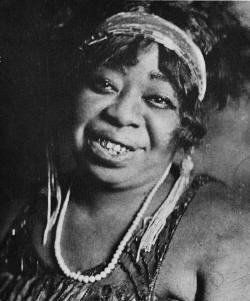

Queer Places:
805 5th Ave, Columbus, GA 31901
Porterdale Cemetery, Columbus, GA 31901
 "Ma"
Rainey (born Gertrude Pridgett, September 1882[1]
or April 26, 1886 – December 22, 1939)[2]
was one of the earliest African-American professional blues singers and one of
the first generation of blues singers to record.[3]
She was billed as the "Mother of the Blues". Numerous African American blues
singers, including Bessie Smith,
Ma Rainey, and
Gladys Bentley, engaged in
romantic relationships with other females (Smith and Rainey had relationships
with both men and women) and sang songs that were tantalizing in their
references to same-sex desire.
"Ma"
Rainey (born Gertrude Pridgett, September 1882[1]
or April 26, 1886 – December 22, 1939)[2]
was one of the earliest African-American professional blues singers and one of
the first generation of blues singers to record.[3]
She was billed as the "Mother of the Blues". Numerous African American blues
singers, including Bessie Smith,
Ma Rainey, and
Gladys Bentley, engaged in
romantic relationships with other females (Smith and Rainey had relationships
with both men and women) and sang songs that were tantalizing in their
references to same-sex desire.
She began performing as a young teenager and became known as Ma Rainey after her marriage to Will Rainey, in 1904. They toured with the Rabbit Foot Minstrels and later formed their own group, Rainey and Rainey, Assassinators of the Blues. Her first recording was made in 1923. In the next five years, she made over 100 recordings, including "Bo-Weevil Blues" (1923), "Moonshine Blues" (1923), "See See Rider Blues" (1924), "Black Bottom" (1927), and "Soon This Morning" (1927).[4]
Rainey was known for her powerful vocal abilities, energetic disposition, majestic phrasing, and a "moaning" style of singing. Her powerful voice was never adequately captured on her records, because she recorded exclusively for Paramount, which was known for its below-average recording techniques and poor shellac quality. However, her other qualities are present and most evident in her early recordings "Bo-Weevil Blues" and "Moonshine Blues".
Rainey recorded with Louis Armstrong, and she toured and recorded with the Georgia Jazz Band. She continued to tour until 1935, when she retired and went to live in her hometown.[2]
Although most of Rainey's songs that mention sexuality refer to love affairs with men, some of her lyrics contain references to lesbianism or bisexuality,[21] such as the 1928 song "Prove It on Me":
They said I do it, ain't nobody caught me.
Sure got to prove it on me.
Went out last night with a crowd of my friends.
They must've been women, 'cause I don't like no men.[22]
According to the website queerculturalcenter.org, the lyrics refer to an incident in 1925 in which Rainey was "arrested for taking part in an orgy at [her] home involving women in her chorus."[23] "Prove It on Me" further alludes to presumed lesbian behavior: "It's true I wear a collar and a tie ... Talk to the gals just like any old man."[24] The political activist and scholar Angela Y. Davis noted that "'Prove It on Me' is a cultural precursor to the lesbian cultural movement of the 1970s, which began to crystallize around the performance and recording of lesbian-affirming songs."[25]
Towards the end of the 1920s, live vaudeville went into decline, being replaced by radio and recordings.[20] Rainey's career was not immediately affected; she continued recording for Paramount and earned enough money from touring to buy a bus with her name on it.[26] In 1928, she worked with Dorsey again and recorded 20 songs, before Paramount terminated her contract.[27] Her style of blues was no longer considered fashionable by the label.[28]
In 1935, Rainey returned to her hometown, Columbus, Georgia, where she ran three theatres, the Lyric, the Airdrome, and the Liberty Theatre[29] until her death. She died of a heart attack in 1939, at the age of 53[30] (or 57, according to the research of Bob Eagle), in Rome, Georgia.[31]
In 2017, the Rainey-McCullers School of the Arts opened in Columbus, Georgia, named in honor of Rainey and author Carson McCullers.[36]
My published books: